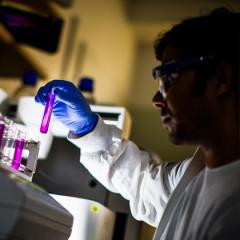Greener batteries, designer nanoparticles, and smart superconducting magnet systems are moving from the lab bench to the real world thanks to a $2 million funding boost that allows Australian Institute for Bioengineering and Nanotechnology (AIBN) researchers to team up with industry heavyweights

Two projects led by AIBN researchers – and two more featuring some of our brightest minds – have been recognised under the latest Australian Research Council Linkage Grants round, a federal funding initiative that aims to initiate or develop long term strategic research alliances between big business and research institutes.
Eight projects in Queensland and 57 across the nation were awarded Linkage grants of between $900,000 and $100,000 this round, for a total prize pool of $28 million.
The $2 million dished out to AIBN-linked projects follows on from a successful February Linkage round where another three projects featuring ten AIBN scientists received $1.5 million in funding.
Designer Nanoparticles for mRNA Protein Factories
In the latest Linkage scheme, AIBN senior group leader Professor Chengzhong (Michael) Yu has won $402,115 to develop a new nanoparticle delivery system that ultimately enhances the performance of mRNA therapies.
mRNA is a highly lucrative field of therapeutic science and is emerging as a major drug platform, though the manufacturing phase is often hampered by low protein production performance.

Professor Yu will be working with UK-based N4 Pharma to fix this issue by building new knowledge in custom-design of functional nanomaterials for mRNA delivery.
“We will be working on new technology that brings clear commercial benefits, not just for our industry partner, but the wider mRNA industry and biopharma sector,” Professor Yu said.
Advanced all-Iron flow batteries
Meanwhile, AIBN group leader and materials scientist Dr Bin Luo has secured $460,697 in Linkage funding to further his work on iron flow batteries.
Dr Luo said Iron flow batteries were one of the most promising choices for clean, reliable and cost effective long-duration energy storage, but the technology was often seen as unsuitable for large scale commercial deployment.
That’s why he, AIBN colleague Dr Masud Rana, and Prof Ian Gentle from the School of Chemistry and Molecular Biosciences will be working with Energy Storage Industries Asia Pacific, and the Australian Nuclear Science and Technology Organisation to engineer the negative electrode-electrolyte interface needed to improve battery performance.
“We expect that this project will result in new materials and methods for advanced battery technology, while also supporting the national priority of net-zero carbon emissions by 2050,” Dr Luo said.
Next generation 'smart' superconducting magnet system
Another successful Linkage application – this time submitted through UQ’s Faculty of Engineering, Architecture and Information Technology – features the excellent work of AIBN affiliate Associate Professor MD Shahriar Hossain, and AIBN senior group leader Professor Yusuke Yamauchi.

The pair will use their $471,472 grant in tandem with US company Hyper Tech Research Inc to make a next generation 'smart' superconducting magnet system that operates in persistent mode.
This project aims to develop novel, reliable and economical superconducting splicing technologies that can produce an ultra-stable and uniform magnetic field against unexpected power outages.
Expected outcomes include the development of advanced green and cryogen free superconducting technologies, which would boost the Australian manufacturing industry through access to multi-billion-dollar global markets for power grids, medical imaging and energy generation and storage.
Imaging the love receptor’s engagement
Finally, the team at the AIBN's Centre for Advanced Imaging have proven central to a $723,641 Linkage grant that will be used to develop a positron emission tomography (PET) ligand for the oxytocin receptor.

The CAI's Dr Karine Mardon - a National Imaging Facility Fellow and Molecular Imaging Facility Manager - is a key contributor to the project, which is being led by the University of Sydney's professor Michael Kassiou, in tandem with Kinoxis Therapeutics.
The research team said the PET ligand project was significant as it will help answer questions about the role of the oxytocin receptor in the important process of social behaviour which underlies quality of life.
"This knowledge gap has remained unanswered for decades due to the lack of specific techniques to measure oxytocin receptor engagement," the researchers reported in their project submission.
"It is also significant as it will equip Australian startup Kinoxis Therapeutics to progress their molecules to market, a process enabled by measuring oxytocin receptor engagement."


